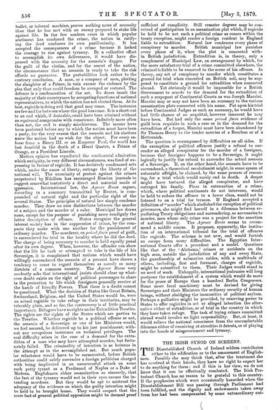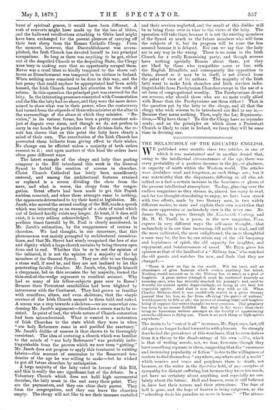burst of spiritual graces, it would have been different. A
rush of converts might have made up for the loss of tithes, and the hallowed recollections attaching to Glebe land might have been exchanged for the present pleasure of carrying off their best sheep from the Roman Catholic Clergy. From the moment, however, that Disestablishment was accom- plished, the Irish Church has devoted herself to two principal occupations. So long as there was anything to be got, either out of the despoiled Church or the despoiling State, the Clergy were busy in making sure that no opportunity escaped them. Never was a cruel blast so kindly tempered to the shorn suf- ferers as Disendowment was tempered to its victims in Ireland. When nothing more remained to be done in this way, and the last penny that could anyhow be appropriated had been safely housed, the Irish Church turned her attention to the work of reform. In this operation the principal part was reserved for the laity. In the interesting processes connected with Commutation and the like the laity had no share, and they were the more deter- mined to show what was in their power, when the controversy had turned from the stipends of those who minister at the altar to the surroundings of the altars at which they minister. " Re- vision," in its various forms, has been a pretty constant sub- ject of dispute ever since, and though we do not profess to carry in our heads the particulars of the division-lists, the re- sult has shown that on this point the laity have clearly a mind of their own. The constitution of the Irish Church has prevented them hitherto from giving effect to their wishes. No change can be effected unless a majority of both orders consent to it ; and upon matters of this kind the orders have often gone different ways.
The latest example of the clergy and laity thus parting company is the Bill introduced this week in the General Synod to forbid the erection of screens in churches. Christ Church. Cathedral has lately been munificently restored, and among the architectural features retained or replaced is a screen dividing the choir from the nave, and what is worse, the clergy from the congre- gation. Great efforts had been made to get this Popish emblem removed, and when these attempts came to nothing, the opponents determined to try their hand at legislation. Mr. Jacob, who moved the second reading of the Bill, made a speech which was interesting as an example of a state of mind which out of Ireland hardly exists any longer. At least, if it does still exist., it is very seldom acknowledged. The approach of the perilous times foretold by St. Paul is clearly manifested, in Mr. Jacob's estimation, by the reappearance of screens in churches. We had thought, in our innocence, that this phenomenon was mainly prompted by architectural considera- tions, and that Mr. Street had wisely recognised the loss of size and dignity which a large church sustains by being thrown open from end to end. Whether this be or be not the opinion of the initiated, it is not the opinion of a majority of the lay members of the General Synod. They are able to see through a stone wall, if need be, and they are not inclined to let this penetrating faculty slumber. Mr. Jacob, who, though himself a clergyman, led on this occasion the lay majority, turned the thin-end-of-the-wedge argument to excellent account. Why had so many of his fellow-subjects gone over to Rome ? Because their Protestant sensibilities had been blighted by intercourse with the Continent. They had grown so familiar with crucifixes, altars, and even skeletons, that the simple services of the Irish Church seemed to them bald and naked. A screen was a step towards a skeleton—we are somewhat con- densing Mr. Jacob's argument—therefore a screen was to be re- sisted. In point of fact, the whole nature of Church restoration had been misunderstood. What is wanted is a restoration of Irish Churches to the state which they were in when " our holy Reformers came in and purified the sanctuary." Mr. Jacob's dislike of screens is thus shown to be thoroughly consistent. The idea of restoring a church which was familiar to the minds of " our holy Reformers " was probably indis- tinguishable from the process which we now term " gutting." Mr. Jacob does not propose to apply this treatment to existing fabrics—this amount of concession to the Romeward ten- dencies of the age he was willing to make—but he wished to gut all future churches by anticipation.
A large majority of the laity voted in favour of this Bill, and this is really the one significant fact of the debate. In a Voluntary Church which does not hold high sacramental doctrine, the laity must in the end carry their point. They are the paymasters, and they can close their purses. They form the congregation, and they can leave the churches empty. The clergy will not like to see their incomes curtailed and their services neglected, and the result of this dislike will be to bring them over in time to the views of the laity. The operation will take time, because it is not the existing members of the Synod so much as the future members who will form the subjects of it, but its progress will be none the less assured because it is delayed. Nor can we say that the laity are in any way in the wrong. There is no room in the Irish Church for a really Romanising party, and though screens have nothing specially Roman about them, yet they are liked by those who sympathise more or less with the English Ritualists, and consequently the opposition to them, absurd as it may be in itself, is not absurd from the point of view of its authors. The majority of the Irish laity want to make Irish churches and Irish services indis- tinguishable from Presbyterian Churches except in the use of a set form of congregational worship. The Presbyterians do not use screens, why should those who are no more really allied with Rome than the Presbyterians use them either ? That is the question put by the laity to the clergy, and all that the clergy who wish screens to be introduced can find to say is,— Because they mean nothing. Then, reply the Lay Representa- tives,—Why have them ? To this the Clergy have no rejoinder ready, and on the principles on which alone a Protestant Church is likely to exist in Ireland, we fancy they will be some time in devising one.



































 Previous page
Previous page